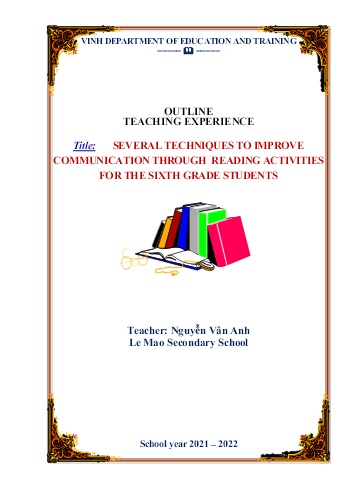Title Several Techniques to improve communication through reading activities for the sixth grade students
Bạn đang xem tài liệu "Title Several Techniques to improve communication through reading activities for the sixth grade students", để tải tài liệu gốc về máy hãy click vào nút Download ở trên.
Tóm tắt nội dung tài liệu: Title Several Techniques to improve communication through reading activities for the sixth grade students

VINH DEPARTMENT OF EDUCATION AND TRAINING ===== ===== OUTLINE TEACHING EXPERIENCE Title: SEVERAL TECHNIQUES TO IMPROVE COMMUNICATION THROUGH READING ACTIVITIES FOR THE SIXTH GRADE STUDENTS Teacher: Nguyễn Vân Anh Le Mao Secondary School School year 2021 – 2022 I. INTRODUCTION I. Rationale of the study. In my point of view, the very last aim of every language learner is to be able to communicate with other speakers. Speaking is a crucial part of second language learning and teaching. So that during the teaching, most teachers are concerned about organizing effective activities in class to help students speak English better and better. The fact is that these students need amounts of vocabulary, grammar and practical knowledge to deal with the given task. In the process of both teaching and observing students, I found that the students often find communication in reading lessons difficult. So, how can we help students to improve communication through reading activities? II. Theoretical background. 1. Definitions of teaching reading 2. The importance of teaching reading 3. Steps in teaching reading 4. Definitions of communication. 5. The advantages of developing communication through reading activities. III. Practical background 1. Advantages: - Students are aware of the importance of English - The new version of English textbook to be used in the school year of 2021-2022 - Each classroom now is equipped with teaching facilities : projectors, speakers, radios, televisions ... 2. Disadvantages: - The textbook is new to both students and teachers. - Some types of exercises in the textbook may make students feel bored. - There are different levels of students’ ability, so teachers should adapt suitable methods and techniques for particular students or classes. III. The reality of teaching reading. * About teachers: - Teachers rely heavily on textbooks and have little investment in designing a variety of activities. - The teachers have not trained their students to become confident during language classes. - Teachers often focus on teaching grammar and writing, reading but not speaking. * About students: - Students are not confident to speak English in class. - They think reading lessons are boring because all activities are completing exercises only. - They don't remember vocabulary as well as are not sure about pronunciation. II. Interviews. Example No. 1: UNIT 1. HOME (Lesson 2. Housework) Tasks: Work in pairs/ groups. Ask and answer about the housework. Length of time: 4-5 minutes Questions: Who does shopping in your family? - My mother does. Who Your family - does the shopping? - clean the kitchen? - does the dishes? - makes dinner? - cleans the bathroom? - does the laundry? Example No. 2: UNIT 4. FESTIVAL AND FREE TIME ( Lesson 2. Festival activities) Tasks: Work in pairs. Give your opinion about the events, using the adjectives above. Length of time: 4-5 minutes III. Mapped dialogue: Aim: To make a habit of building new dialogues with vocabulary and knowledge in reading lesson. Length of time: 4-5 minutes Teaching aids: Mapped dialogues IV. Videos. Aim: - To make a habit of talking about new topic. Length of time: 4-5 minutes Teaching aids: Videos and questions Example No. 1: UNIT 2. SCHOOL (Lesson 3. Favorite book) Tasks: Ask and answer about a film which is based on a book. Questions: Teacher: Have you seen the film? Student: Yes/ No. Teacher: What film is it? Student: Tôi thấy hoa vàng trên cỏ xanh Teacher: Who are main characters? Teacher: Thieu, Ngan, .. Example No. 2: UNIT 1. HOME (Lesson 3. A city in Vietnam) Task: - Ask and answer about hometown. - Record a video to talk about your hometown. Questions: Student A: What is the name of your hometown? Student B: It’s Thanh Chuong. Student A : Where is your hometown? Student B: It’s a small village, in Nghe An Province Student A : What is there in your hometown? Student B: It has many small rivers, and beautiful rice paddies. Student A : What is it famous for? Student B: It is famous for Nhut Thanh Chuong, fresh fruit, and traditional cakes. Student A : What do you like about it? Student B: People here are very friendly and kind. C. CONCLUSION I. The result II. Personal experience Writer’s signature Nguyễn Vân Anh
File đính kèm:
 title_several_techniques_to_improve_communication_through_re.pdf
title_several_techniques_to_improve_communication_through_re.pdf

